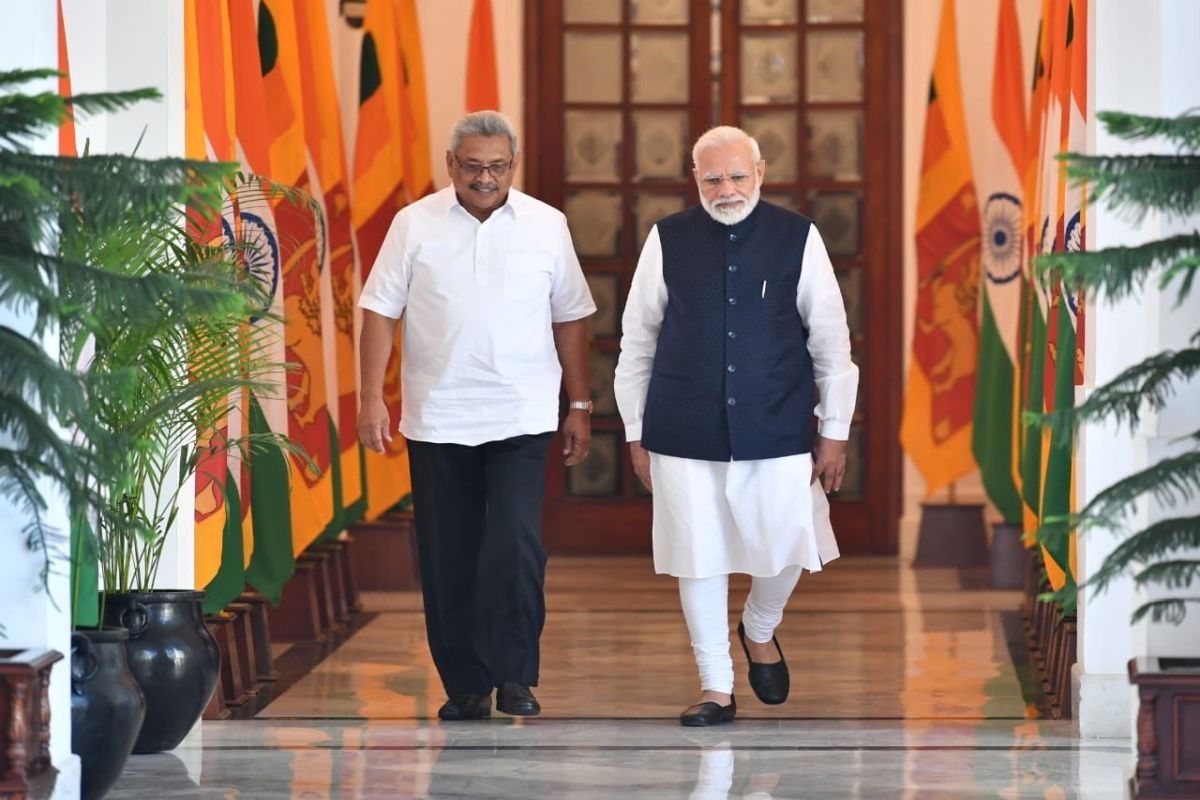
Prime Minister Narendra Modi (R) with newly-elected Sri Lanka President Gotabaya Rajapaksa (L), New Delhi, 29 Nov. 2019
Since the setback in Nepal three years ago when the Indian diktat on the contents of a new constitution for that country was brusquely dismissed by that country’s communist leadership, Modi government faces a similar rebuff from Sri Lanka. President Gotabaya Rajapaksa chose a press conference Thursday with the Colombo-based foreign correspondents to make it clear that Delhi should simply forget about the management of the Mattala International Airport.
He said, “There is no discussion with India on this project.” Barely three weeks have passed since his visit to New Delhi at PM Narendra Modi’s invitation. During the visit, at a joint press conference with Gotabaya, Modi had announced a $450 million credit line for Sri Lanka.
Mattala is a feeder airport for Hambantota Port, which is run by a Chinese state-owned company. Mattala would have been an ideal place from where Chinese activities in Hambantota could be monitored. Conceivably, that is precisely the reason why Sri Lanka has decided to disallow any Indian presence in Mattala. Possibly, China leveraged its influence in Colombo.
Clearly, Sri Lanka wants to keep India out of any projects of strategic significance. Modi’s charm offensive following Gotabaya’s thumping election victory in November has fallen flat. Gotabaya doesn’t seem to be overawed by the $450 credit line. In reality, Gotabaya may even have turned the table by launching a charm offensive of his own to insist on Modi being his first state guest in Colombo.
At the press conference on Thursday, Gotabaya also announced that he would not renegotiate the commercial agreement of the Hambantota Port project, since an agreement has already been concluded with a Chinese company, and would instead merely examine whether the entire security of the port was under Sri Lanka’s control. In his words,
“I am now not here to renegotiate the agreement as it is a commercial contract and I am not worried about the commercial aspect. But I am concerned about the security aspect as to whether there are any security lapses. That is what I am discussing with China.”
According to a Xinhua report, Gotabaya further said that he had conveyed these concerns to China through a visiting special Chinese envoy who visited Sri Lanka recently, and China too had agreed that the security aspects must be with the Sri Lankan government and they are ready to reassure the security deal.
Taken together, all this will come as a nasty blow to the Indian establishment. Delhi was hoping that Gotabaya might be amenable to curbing the Chinese presence in the highly strategic deep water port in Hambantota which is located close to the sea lanes in the Indian Ocean — and India will keep a close tab on what’s happening from Mattala.
What explains such cold blast blowing from Colombo? Indeed, Sri Lanka has been traditionally wary of Indian presence. But their considerations today can be largely attributed to the perception (not only in Sri Lanka but in the region as a whole) that India is becoming the poodle of the United States.
Simply put, Sri Lanka does not want to be part of the US-Indian Indo-Pacific strategy to contain China. This is one thing.
Two days ago, Washington highlighted that Sri Lanka and Nepal figured in the recent 2+2 US-Indian dialogue of foreign and defence ministers which took place this week in Washington. Indeed, Colombo will be extremely wary of the US-Indian intentions.
Washington had reacted in unfriendly terms to Gotabaya’s victory last month. The secretary of state Mike Pompeo chose his message of felicitations to virtually threaten to reopen Gotabaya’s record on human rights during the war with LTTE, and linked it with Colombo’s willingness to get on board the US’ Indo-Pacific strategy.
Without doubt, a mutually satisfactory formula has been worked out between Colombo and Beijing whereby Gotabaya would go through the motions of examining India’s security concerns while the Chinese control of Hambantota Port under the 2017 deal as such (99-year lease to China’s Merchants Port Holdings Company) remains untouched.
Sri Lankan authorities are aware that the Indian analysts do not give credence to Colombo’s assurances that Hambantota port will be civilian and under its explicit control. The Indian analysts estimate that a process for the creation of a Chinese naval outpost in India’s neighbourhood is getting under way. Quite obviously, India simply has to learn to live with the Chinese presence in Hambantota.
Beijing is no longer treading softly on Indian sensitivities, either. A press release issued by the Chinese embassy today celebrates that Beijing won the great game over Hambantota. India’s ‘Quad card’ has probably irritated Beijing, which is sure to render it a joker in the pack when it comes to South Asia and the Indian Ocean. Make no mistake, after the recent years’ lull, Beijing intends to step up its presence in Sri Lanka to hit back at India where it hurts.
The big question now is about the project for the development of the East Container Terminal (ECT) of Colombo port. This is also a long-standing Indian dream project. An MOU was signed in May whereby India and Japan joined hands to undertake the project. Japan has offered a $500 million loan for the project.
Xinhua carried a report soon after Gotabaya assumed office last month to the effect that the new government aims to fast-track the ECT project. Will India make it this time around? It’s sure to be a pip of a story in the months ahead.
